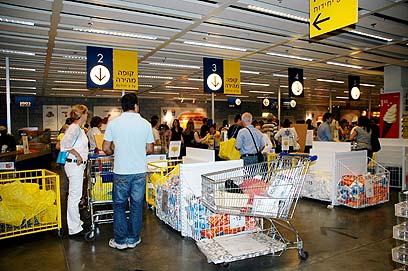_a.jpg)
Did immigrants boost Israel's high-tech industry?
צילום: ירון ברנר
Did Russians save Israel?
Experts divided on contribution of massive Russian immigration to Israel's economy
About 950,000 people immigrated to Israel in the 1990s from the former Soviet Union, comprising about 30% of Soviet Jewry and becoming 15% of Israel's population. Twenty years later, can we convincingly say that the massive immigration wave changed the face of Israel's economy? Ynet spoke to two experts and received two very different answers.
Shlomo Maoz, the chief economist of investment house Excellence Nessuah, is extremely enthusiastic when addressing the contribution of Russian immigrants.
"The Russians saved Israel, big time," Maoz told Ynet. "The immigration wave improved our situation in almost every parameter. The economy was infused with a million new consumers. Hundreds of companies, ranging from the Electric Company to biscuit producers, increased their market by 20%."
Maoz says that the increase in consumption also prompted an immense growth in imports and exports. He adds that the new immigrants greatly boosted Israel's high-tech industry, as result of the integration of IDF veterans' know-how with the knowledge brought by Russian immigrations.

Huge increase in consumption (Photo: Galit Kosovsky)
"I’m not only referring to high-tech in the narrow sense of software companies, but to the entire technology industry," he says. "In the corridors of such plants you hear Russian. We are dealing with educated, hard-working, and disciplined employees. They dramatically boosted the level of production here."
Maoz says that the new immigrants also indirectly boosted the production level of veteran Israelis.
"They are ambitious, which caused the veterans to fear for their status and therefore made them more hard-working and more competitive," he says. "They affected education rates similarly. The average Israeli discovered that he has a Russian neighbor with a degree and also wanted to get one."
The Russian immigrants arrived from a country boasting an excellent education system, Mofaz adds.
"We are dealing with a grand robbery of brains," he says. "We should thank Mother Russia for letting them come here."
'No economic revolution'
However, not everyone agrees with Maoz' highly favorable assessment. Hebrew University Professor Joseph Zeira told Ynet that despite the positive contribution, "Russian immigrants did not prompt an economic revolution.""In the short term, the immigrants created large consumer demand and ended the recession of 1989 that broke out because of the first Intifada," he says. "Yet in the long term, it's hard to tell what would happen without those immigrants. These are hypothetical rather than scientific calculations…yet I don't see any reason to think that the country would face a different economic situation if it wasn't for the immigration wave."
Zeira says that the main growth engine of the high-tech industry was the subsidization it received from its first and largest client, the IDF.
"The big leap in high-tech came before the immigrants came, at the end of the 1980s, when the government cut the defense establishment's budget and engineers were looking for work," he says.
As to the increase in production, Zeira says it had been rising consistently since the 1970s.
"We did not see a leap in production in the 1990s, so I do not see a reason to think that the improvement had to do with the immigrants," he says.
The professor also says that Israel's education system is better than Russia's, and that the grave problems in the country's education system are a product of the last 20 years, after the Russian immigrants arrived.
"There is no doubt that the Russians brought high levels of human capital," he says. "However, through no fault of their own they suffered a well-known phenomenon just like any other immigrant: Their abilities were eroded upon their arrival and were worth much less than in their home countries. They didn't know the language and local customs, and in practice contributed less than what their formal education is worth."
Zeira stresses that Soviet immigrants made an immense contribution to the country, including on the cultural front, but says that they did not prompt a decisive economic change.
"Israel would still be a Western country with a prospering industrial sector, with them or without them," he says.










